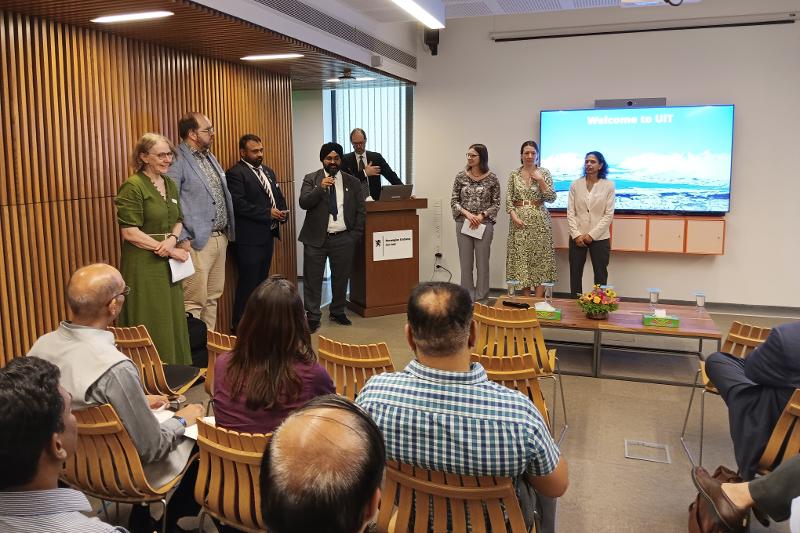Aiming to accelerate health innovation in Norway and India
In the Photonics4Life project, UiT and Indian partners will develop innovative health technology by moving the laboratory as close as possible to patient-centred work.

INCP is a programme established to strengthen interdisciplinary collaboration and exchange between higher research and educational institutions in Norway and India.
Incoming applications to INCP are processed by the Directorate for Higher Education and Skills (HK-dir) and the University Grants Commission India (UGC).
The allocations of INCP aim to enhance the quality of research and higher education and facilitate close cooperation between research institutions in both countries, and also with business and industry.
If one is to adapt health tools by moving the laboratory as close as possible to patient-centred work, a multidisciplinary and innovative approach is crucial.
Facts about the Photonics4Life Project
- A research project established to use photonics technology to develop innovative solutions for global health challenges.
- In 2024, the project received 2.8 million kroner in support from the India-Norway Cooperation Programme (INCP) and three million kroner from the Utforsk programme.
Collaborative partners in Norway:
- Norinnova
- Inland Norway University of Applied Sciences
- University Hospital of North Norway (UNN)
- UiT The Arctic University of Norway
- SINTEF Digital
Collaborative partners in India:
- India: IIT Delhi (IITD, main partner)
- IIT Hyderabad (IITH)
- IIT Madras (IITM)
- Apollo Cancer Institutes
- Center for Healthcare and Entrepreneurship (CfHE)
- Kamineni Hospitals
Among the 88 who applied for INCP2 this year, 12 projects were granted support of 2.8 million kroner each, with three of the recipients being UiT researchers. The Pro-Dean for Doctoral Education at the NT faculty and Professor of Mathematics, Cordian Riener, has received support for a project that involves the use of mathematical theory models to develop more efficient data transmission and more secure data encryption. Another project that received funding from INCP is aimed at interdisciplinary education and research in bioscopy, and is led by Krishna Agarwal, Professor at the Department of Physics and Technology.
The project ranked number 1 by INCP is Photonics4Life, which has also received three million kroner in support from HK-dir through the UTFORSK programme. The project spans over four years and includes the use of advanced photonics technology that can be tested in treatment situations, in close cooperation with five Indian and Norwegian research institutes.
Collaborative partners in the project will contribute with specialist expertise in advanced medical technology. This may involve nanofabrication (SINTEF), genomics and antimicrobial resistance (UNN), and advanced microscopy and spectroscopy (UiT, IITD, and IITM).
Advanced diagnostic tools
The technology developed in the project will be used for diagnosing diseases and conditions considered to be societal challenges, such as oral and breast cancer, immune resistance, or infertility. This involves digital analyses of diseases, with AI as a support tool.
"Health diagnostic technologies need to be sensitive, portable, and affordable to maximise research outcomes. Photonics technologies, combined with AI, have proven to be promising tools within healthcare. If one is to adapt health tools by moving the laboratory as close as possible to patient-centred work, a multidisciplinary and innovative approach is crucial," emphasises project leader and Professor Balpreet Singh Ahluwalia, at the Department of Physics and Technology.
Innovation based on practical challenges

The project brings together researchers from five different disciplines and regions, who will develop a joint strategy aimed at problem-solving, in order to create innovation that is practical and tailored to the daily challenges of hospitals.
"The goal of this project is that the results from basic research benefit as many people as possible, and that it can also have ripple effects for global health challenges. Additionally, the project will accelerate innovation in healthcare by providing training and support in an innovation ecosystem. When primary healthcare clinics can adopt new technology at an early stage, more effective measures will be implemented that benefit public health," says Ahluwalia.
He adds that the project will offer a new generation of researchers access to newly developed technology that can be used for medical research. They will also receive training in innovation and entrepreneurship, and in developing interdisciplinary skills, by adapting this technology to handle daily clinical challenges at three hospitals and health innovation centres in India and Norway.
The goal of this project is that the results from basic research benefit as many people as possible, and that it can also have ripple effects for global health challenges.
Establishment of a Virtual Centre
Over a decade, UiT and IIT Delhi have been engaged in a research collaboration on photonics through the researcher network INTPART (2020-2024), supported by INCP-1 (2015-2018). The collaboration has led to the development and testing of a range of advanced technological tools within optical microscopy and spectroscopy. Over the years, there have also been 50 exchanges of researchers between Norway and India, 60 scholarly articles have been published, and five doctoral theses in the field of photonics have been completed.
The new Photonics4Life project will also lay the foundation for a master's degree in photonics and nanotechnology at UiT, starting in 2026. In the long term, a virtual centre for Photonics4Life will also be established. There, PhD candidates and master's students from all partner institutions can receive guidance from a lead researcher in the project (PI), by organising workshops and two summer schools.
-
Fiskeri- og havbruksvitenskap - bachelor
Varighet: 3 År -
Fiskeri- og havbruksvitenskap - master
Varighet: 2 År -
Akvamedisin - master
Varighet: 5 År -
Bioteknologi - bachelor
Varighet: 3 År -
Arkeologi - master
Varighet: 2 År -
Musikkteknologi
Varighet: 2 Semestre -
Computer Science - master
Varighet: 2 År -
Geosciences - master
Varighet: 2 År -
Technology and Safety in the High North - master
Varighet: 2 År -
Physics - master
Varighet: 2 År -
Mathematical Sciences - master
Varighet: 2 År -
Molecular Sciences - master
Varighet: 2 År -
Luftfartsfag - bachelor
Varighet: 3 År -
Arkeologi - bachelor
Varighet: 3 År -
Informatikk, datamaskinsystemer - bachelor
Varighet: 3 År -
Informatikk, sivilingeniør - master
Varighet: 5 År -
Geologi - bachelor
Varighet: 3 År -
Kjemi - bachelor
Varighet: 3 År -
Samfunnssikkerhet og miljø - bachelor
Varighet: 3 År -
Automasjon, ingeniør - bachelor (ordinær, y-vei)
Varighet: 3 År -
Samfunnssikkerhet - master
Varighet: 2 År -
Farmasi - master
Varighet: 2 År -
Romfysikk, sivilingeniør - master
Varighet: 5 År -
Klima og miljøovervåkning, sivilingeniør - master
Varighet: 5 År -
Bærekraftig teknologi, ingeniør - bachelor
Varighet: 3 År -
Forkurs for ingeniør- og sivilingeniørutdanning
Varighet: 1 År -
Anvendt fysikk og matematikk, sivilingeniør - master
Varighet: 5 År -
Praktisk-pedagogisk utdanning for trinn 8-13 - årsstudium (deltid)
Varighet: 2 År -
Internasjonal beredskap - bachelor (samlingsbasert)
Varighet: 3 År -
Datateknikk, ingeniør - bachelor (y-vei)
Varighet: 3 År -
Droneteknologi, ingeniør - bachelor
Varighet: 3 År -
Bygg, ingeniør - bachelor
Varighet: 3 År -
Bygg, ingeniør - bachelor (nettbasert)
Varighet: 3 År -
Bygg, ingeniør - bachelor (y-vei)
Varighet: 3 År -
Datateknikk, ingeniør - bachelor
Varighet: 3 År -
Datateknikk, ingeniør - bachelor (nettbasert)
Varighet: 3 År -
Elkraftteknikk, ingeniør - bachelor
Varighet: 3 År -
Elektronikk, ingeniør - bachelor
Varighet: 3 År -
Elektronikk, ingeniør - bachelor (y-vei)
Varighet: 3 År -
Maskin, ingeniør - bachelor
Varighet: 3 År -
Maskin, ingeniør - bachelor (nettbasert)
Varighet: 3 År -
Maskin, ingeniør - bachelor (y-vei)
Varighet: 3 År -
Satellitteknologi, ingeniør - bachelor
Varighet: 3 År -
Satellitteknologi, ingeniør - bachelor (y-vei)
Varighet: 3 År -
Applied Computer Science - Master
Varighet: 2 År -
Electrical Engineering - Master
Varighet: 2 År -
Engineering Design - Master
Varighet: 2 År -
Industrial Engineering - Master
Varighet: 2 År -
Aerospace Engineering - master
Varighet: 2 År -
Bygg og miljø, sivilingeniør - master
Varighet: 2 År



